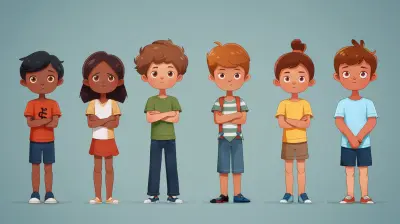The Sustainability of Open Educational Resources in Today’s Education
4 September 2025
Education has evolved tremendously over the years, yet one thing remains constant—its necessity. In a world where access to knowledge can shape lives, Open Educational Resources (OER) have emerged as a beacon of hope for students, educators, and lifelong learners alike. But how sustainable is this model in today’s education system? Can free and open resources truly stand the test of time? Let’s dive deep into the world of OER and understand its long-term viability. 
What Are Open Educational Resources (OER)?
Before we evaluate their sustainability, let’s first understand what OER actually are.Open Educational Resources are freely accessible and publicly licensed teaching, learning, and research materials. These can range from textbooks, courses, lecture notes, quizzes, and even full-fledged degree programs—all available at no cost to the user. The idea is simple: education should be accessible to everyone, regardless of financial constraints.
With the internet becoming an integral part of learning, OER have drastically changed how knowledge is shared. But can they continue to thrive? That’s the million-dollar question. 
Why Open Educational Resources Matter
1. Bridging the Education Gap
Not every student can afford expensive textbooks or paid courses. OER provide an equal playing field by giving everyone access to quality learning materials without financial barriers. Whether you're a high school student in a remote village or a university scholar in a bustling city, OER ensure that education is within reach.2. Empowering Educators
Teachers and professors no longer need to reinvent the wheel. With OER, they can access high-quality teaching materials, modify them to fit their students' needs, and share them freely. This flexibility makes teaching more effective and dynamic.3. Encouraging Lifelong Learning
Learning doesn't end after school or college. With OER, people of all ages can expand their knowledge anytime, anywhere. Whether you're a professional looking to upskill or a retiree pursuing a new passion, OER support continuous learning.
The Sustainability Challenge
While OER offer undeniable benefits, their long-term sustainability is a major concern. After all, if something is free, who pays for its creation, maintenance, and updates? Let’s examine the factors that impact the sustainability of OER.1. Funding & Financial Support
OER projects require money—whether for content creation, hosting, or updates. Many OER platforms rely on grants, government funding, or donations. But what happens when these financial sources dry up? Without sustainable funding models, many free educational platforms risk shutting down.2. Quality Control & Updates
Education is constantly evolving, and outdated materials can do more harm than good. Unlike traditional textbooks that undergo rigorous updates by publishers, OER often rely on volunteer contributors. Ensuring consistent quality and up-to-date information remains a significant challenge.3. Awareness & Adoption
Despite their benefits, many educators and students still aren’t fully aware of OER. Traditional educational resources dominate academic institutions, making it difficult for OER to gain widespread acceptance. Without mainstream adoption, OER may struggle to remain a primary learning resource.4. Technological Barriers
While the internet has made OER accessible, technological gaps still exist. Some students lack reliable internet access or devices to utilize digital resources. If OER are to be sustainable, they must bridge the digital divide.
Possible Solutions for Sustainable OER
Despite the challenges, there are promising ways to ensure the long-term success of OER.1. Government & Institutional Support
Governments and educational institutions must recognize the value of OER and provide continued funding. Policies that encourage the development and use of OER can significantly improve their sustainability.2. Public-Private Partnerships
Collaboration between universities, non-profits, and tech giants can provide financial and technological support, ensuring that OER thrive. Companies like Google, Microsoft, and IBM are already investing in free educational content. Expanding such initiatives can further sustain OER.3. Freemium & Subscription Models
While core OER content should remain free, platforms can introduce premium services—like certifications, mentorship, or additional learning tools—to generate revenue without compromising accessibility. For instance, Coursera and edX offer free courses with an option for paid certificates.4. Community-Driven Contributions
Just like Wikipedia thrives on volunteer contributions, OER can leverage collaborative efforts from educators, students, and researchers. Encouraging active participation ensures continuous content improvement.5. Integration into Mainstream Education
If schools and universities integrate OER into their official curriculum, their sustainability would significantly improve. This would also boost credibility, making OER a recognized learning standard.The Future of OER: Will They Last?
OER have come a long way, proving that free education can be both impactful and transformative. However, without a sustainable model, their future remains uncertain. The road ahead requires innovation, collaboration, and strong policy frameworks to ensure OER continue benefiting generations to come.But one thing is clear: education should never be a privilege—it should be a right. And as long as passionate educators, institutions, and learners continue to support open knowledge, OER will stand a fighting chance in shaping the future of education.
What are your thoughts on OER? Have they helped you in your learning journey? Let’s keep the conversation going!
all images in this post were generated using AI tools
Category:
Open Educational ResourcesAuthor:

Anita Harmon
Discussion
rate this article
1 comments
Otis McGrath
Open Educational Resources: like pizza! When shared generously, they create a feast of knowledge. Just don’t let the pepperoni (or copyright) spoil the fun. Let's make learning deliciously sustainable!" 🍕📚
September 26, 2025 at 4:10 AM

Anita Harmon
Absolutely! Just like a great pizza, OERs thrive on sharing and collaboration, making education richer and more accessible, while we navigate copyright wisely. Let's keep the learning feast going! 🍕📚


